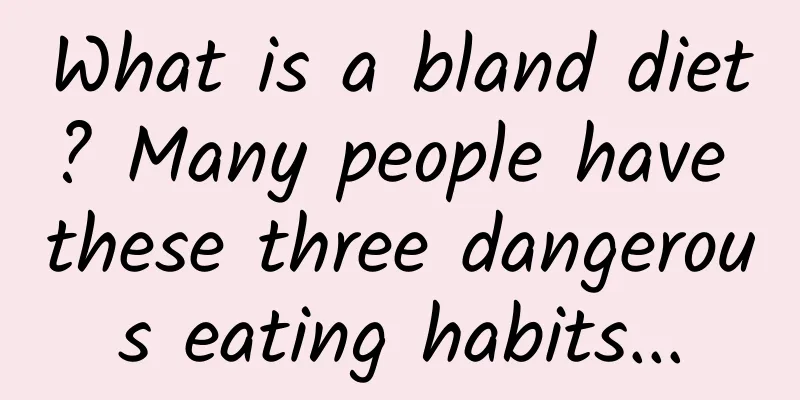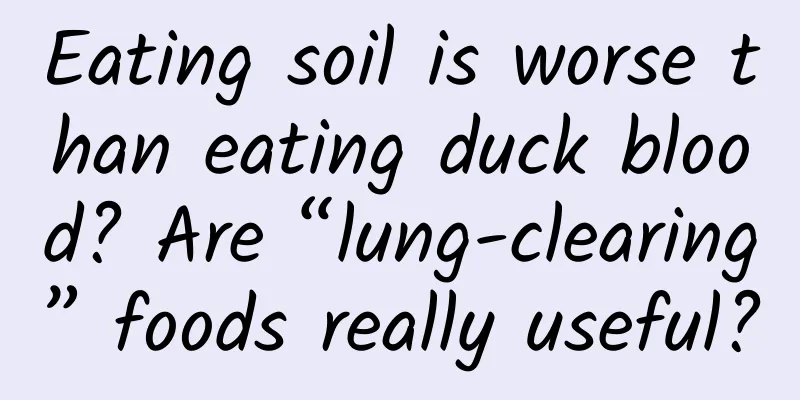What is a bland diet? Many people have these three dangerous eating habits...

|
As the saying goes, "Man is iron and rice is steel, if you don't eat for a meal, you will be hungry." When it comes to Chinese cuisine, it also has a considerable weight in human history. However, a large sample study of people from 195 countries and regions in The Lancet in April 2019 concluded that "Chinese people have a refined diet with little fiber and high salt, and their cancer mortality rate is the highest in the world!" This 2019 article shows that in 2017, China's cardiovascular disease mortality rate and cancer mortality rate caused by dietary problems such as refined diet, low fiber, low fruit intake, and high salt were both ranked first among the top 20 countries with the largest populations in the world (299 deaths per 100,000 people), while Egypt had the highest mortality rate related to all diets (552 deaths per 100,000 people). So, what are the unreasonable aspects of my country's dietary structure? How should we eat? What are the unreasonable aspects of our country’s diet? 0 1 Heavy taste high salt diet A heavy, high-salt diet is often closely related to high blood pressure, increased risk of gastric cancer, promoted calcium loss, and increased burden on the kidneys. Figure 1 Average daily salt intake in different countries (Source: Statista, Author: Martin Armstrong, 2019.8.6) Looking at the world, China's per capita salt intake remains high (see Figure 1) , which is twice the amount recommended by the World Health Organization. 76% of Chinese residents' salt intake comes from household cooking salt, 6.4% comes from soy sauce, and the rest comes from dining out, packaged foods, etc. According to the Survey on Nutritional Status of Chinese Residents: In 2012, the average daily cooking salt intake of Chinese residents aged 18 and above was 10.5g. Combined with the salt ingested through processed foods and the salt inherent in the food itself, the actual salt intake of Chinese residents is about 12g. High salt intake is also related to thyroid abnormalities. In 2021, BMC Cancer published a study conducted by Xiangya Medical College, which found that the vast majority of the population (96.4%) in China's inland hilly areas currently consume more than 5g of iodized salt per day. Among the 51,637 subjects, 20,784 were found to have thyroid nodules, and 390 subjects were diagnosed with thyroid cancer, accounting for 0.76%. 0 2 Focus on the taste of refined white rice and flour staple food The main food in the north of my country is pasta, while in the south it is rice. However, regardless of north, south, east or west, the staple food of Chinese residents is mainly "refined white rice and flour" which focuses on taste and is easy to digest. The "Scientific Research Report on China's Dietary Guidelines (2021)" points out that the daily whole grain intake of adult males in China is 13.9g, and that of women is 14.6g, which is far below the recommended intake . Only about 20% of adults in the country can reach an average daily intake of more than 50g. A study published in the British Medical Journal in 2016 summarized 45 related studies and proved that compared with people who do not eat whole grains, eating 90g of whole grains per day can reduce the incidence of coronary heart disease by 19%, the risk of stroke by 12%, and the overall risk of cardiovascular and cerebrovascular diseases by 22% . If 210-225g is eaten per day, the risk of cancer is reduced by 15% and the all-cause mortality rate is reduced by 17%. 0 3 Low per capita fruit intake The Chinese diet is mainly plant-based and consumes a lot of vegetables, but the fruit intake of Chinese residents is relatively low, around 40g on average, far below the 200-350g/day intake recommended by the dietary guidelines. The fruit is brightly colored and rich in anthocyanins. It also contains abundant dietary fiber, vitamins, minerals, and active substances such as flavonoids and polyphenols. Unlike vegetables that are heated and cooked before consumption, fruits are basically eaten raw. Therefore, they are high in potassium, low in sodium and fat, and their vitamins and minerals are relatively stable. A paper published in The New England Journal of Medicine (2016) selected 10 regions in China and conducted a four-year study (2004-2008). In the survey of 510,000 people aged 30 to 79, 18% of the participants claimed to eat fresh fruit every day; compared with people who never ate fruit or ate less fruit, people who ate fruit every day showed lower systolic blood pressure and lower blood sugar levels. The British Medical Journal (BMJ) published a collaborative paper by Chinese scholars and 40 European scholars (Figure 2), which analyzed large-scale nutritional epidemiological studies in eight countries and found that increasing fruit and vegetable intake can reduce the risk of diabetes. Therefore, it is necessary to increase fruit intake to improve China's dietary structure. Image source: Pixabay After seeing a doctor, we often hear such advice as "eat a light diet", "don't eat irritating foods", "eat more liquid food"... But what do these advices mean? What is considered a "light diet"? "Light diet" is the dietary principle for many chronic diseases, but many people often have misunderstandings when implementing the "light diet" plan. Shi Jie, deputy chief physician of the Nutrition Department of the China-Japan Friendship Hospital, pointed out in an article published in Health Times in April 2021 that the so-called "light diet" does not mean vegetarianism. "Light" mainly refers to less fat, and "light" means using less salt, sugar, spicy and other heavy-tasting condiments when cooking. If you want to eat a light diet, you should also pay attention to the hidden fat (salad dressing, cakes, western bread, etc.) and hidden salt (canned food, pickles, salted fish, salted eggs, sausages, etc.) in the food. The key to a light diet also includes a reasonable cooking method, giving priority to steaming, boiling, stewing, blanching, mixing (warm mixing, cold mixing), stir-frying, etc., and avoiding frying, smoking, and roasting. Image source: Pixabay In addition, a light diet should also achieve food diversity. The "Dietary Guidelines for Chinese Residents (2016)" clearly states that daily meals should include cereals and tubers, vegetables and fruits, livestock, poultry, fish, eggs, milk, soy beans, nuts and other foods, with an average daily intake of more than 12 kinds of food and more than 25 kinds of food per week. Develop healthy eating habits, pay attention to these 3 points 1. There are standards for how much to eat According to the "Dietary Guidelines for Chinese Residents (2016 Edition)", the consumption of different foods in daily diet should meet the following recommended standards: Whole grains: It is recommended to consume 50 g-150 g of whole grains and beans every day, such as wheat, oats, barley, etc. Vegetables: It is recommended to consume 300 g-500 g per day, half of which should be dark vegetables. Fruit: It is recommended to consume 200 g-350 g of fresh fruit every day. Fruit juice cannot replace fruit. Beans and their products: It is recommended to consume 30 g-50 g per day. Nuts: Recommended intake is 50 g-70 g per week. Milk and dairy products: It is recommended to drink 1 cup of milk per day, which is equivalent to 300 g of liquid milk or equivalent dairy products. Fish: It is recommended to eat 280g-525g of fish per week. Water and tea: It is recommended that adults drink 1500ml-1700ml of water per day. Red meat and white meat: It is recommended that adults consume 40g-75g of livestock and poultry meat per day, with poultry meat being given priority. Processed meat: Reduce your intake as much as possible and avoid it if possible. Salt: It is recommended that adults consume no more than 6g of salt per day, which is equivalent to a beer bottle cap. At the same time, they should pay attention to reducing the consumption of processed foods containing salt. Alcohol: Avoid drinking if possible, especially for children, pregnant women and breastfeeding women. Added sugar and sugary drinks: Control the intake of added sugar, no more than 50g per day, preferably less than 25g; it is recommended to drink boiled water and tea, and do not drink or drink less sugary drinks. Oil: The recommended daily amount of cooking oil for adults is 25g-30g, and they should eat less fatty meat and fried foods. 2. What you eat first is important In addition to how much you eat, what you eat first is also important. In 2020, a study published in the Journal of Clinical Nutrition by researchers in Singapore pointed out that the order of eating vegetables-protein-carbohydrates is very effective for controlling postprandial blood sugar; if you cannot accept the practice of eating staple foods on an empty stomach, then you can eat vegetables first, and then eat meat and rice one bite at a time. 3. Eating speed also determines health In December 2021, a study from Italy suggested that eating speed is closely related to metabolic abnormalities, especially in obese people, eating fast will significantly increase the risk of abnormal blood lipid metabolism. Therefore, researchers emphasized that obesity clinics should evaluate patients' eating speed, and dietary education should emphasize the benefits of eating slowly, which may be a simple way to reduce the risk of cardiometabolic diseases in obese people. Source: Chongqing Tianji Network Co., Ltd. This article is compiled from Science Popularization China and Health Times Statement: Except for original content and special notes, some pictures are from the Internet. They are not for commercial purposes and are only used as popular science materials. The copyright belongs to the original authors. If there is any infringement, please contact us to delete them. |
Recommend
Experts recommend: Complete flu vaccination before the end of October! Because...
On September 6, 2024, at the press conference on ...
What to do if a girl's menstruation does not come
Menstruation is a physiological phenomenon that o...
The advantages and disadvantages of women's anal lifting
Anal lifting is a very common exercise method for...
What to do if fungus recurs after abortion
Many women are often affected by gynecological in...
Woman's hip and thigh joint pain
Pain at the junction of a woman's hip and thi...
Don’t think dry lips are just dehydration, they may also be cheilitis
Our lips cannot secrete oil like the skin on our ...
Signs of closure of the girl's bone line
Bone closure is a growth stage that everyone must...
What are the common physical conditions that are prone to getting angry after moxibustion? What should I do if I have toothache and get angry after moxibustion?
If the internal heat is caused by moxibustion, th...
Pelvic nerve compression
Most people believe that nerves will not be compr...
What preparations should be made before pregnancy?
Maybe many of us newlyweds want a child, but havi...
What is Women's Fitness Gear?
In real life, insisting on fitness is of great be...
What causes heavy menstrual flow and long menstrual period?
During menstruation, women should understand thei...
What does contraction feel like and where does it hurt?
What are contractions and where does it hurt? Ute...
How do hairy crabs live longer? How long do hairy crabs usually live?
Hairy crab is a popular delicacy. It is delicious...









